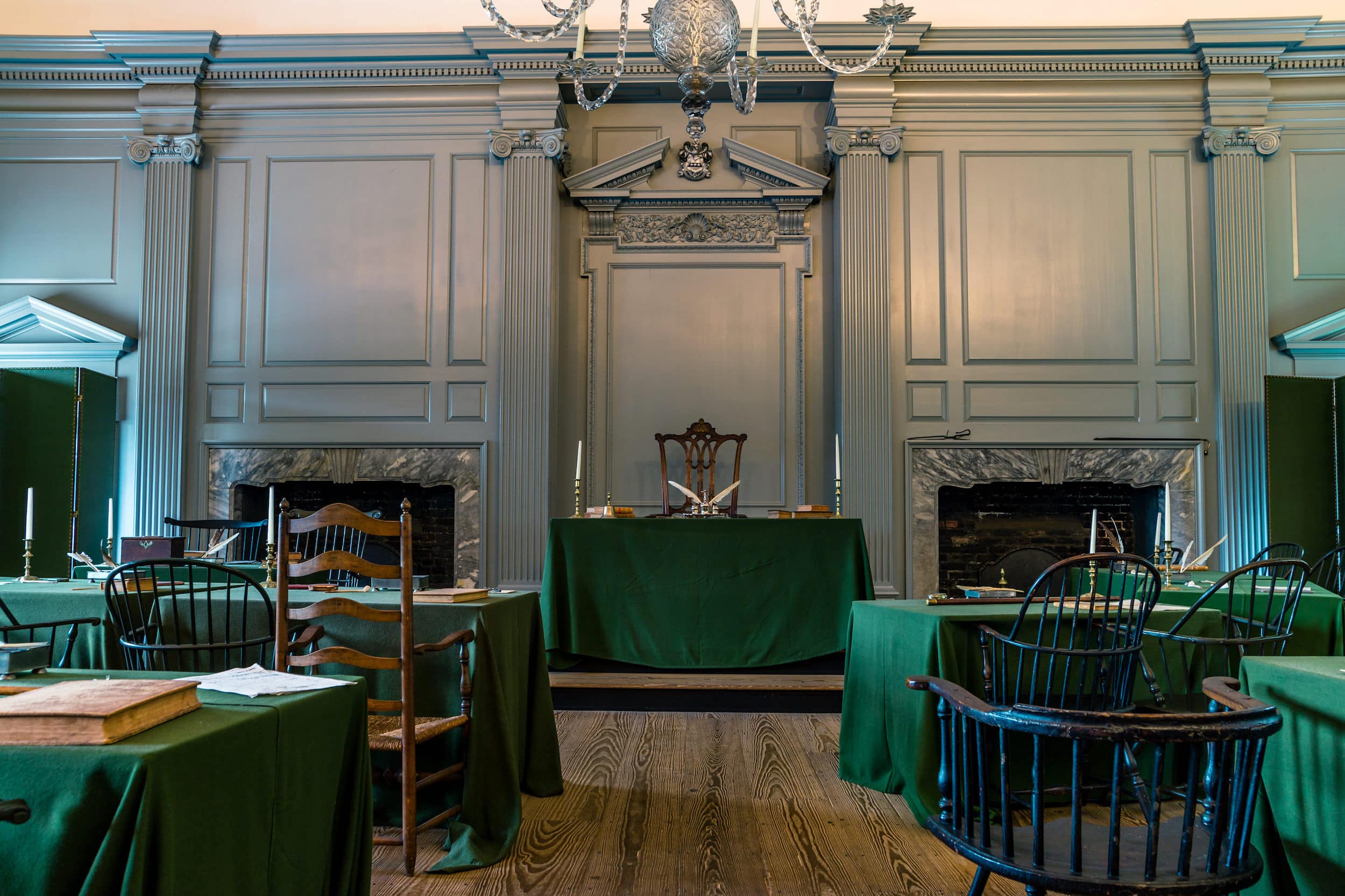“The civil rights of none shall be abridged on account of religious belief or worship, nor shall any national religion be established, nor shall the full and equal rights of conscience be in any manner, or on any pretext, infringed.”
– James Madison
Introduction
Our democracy and our republican form of government is based on the U.S. Constitution. But there are differences of opinion today in how the Constitution should be interpreted and applied in our society, and what the proper role of our government should be. If you look at the daily news, you’ll find it dominated by references to the coronavirus, the rights of transgendered students to compete in athletic events, concerns over the open carry and public display of assault rifles, access to universal health care, pollution, an increase in the minimum wage and so on. If James Wilson or Alexander Hamilton (not to be confused with Lin-Manuel Miranda) were alive today, they would be fairly bewildered by these issues. And who knows with any certainty how they might respond? Yet, any matter of law concerning these issues must be decided directly or indirectly on the text of the Constitution, else a decision is just a matter of a judge making something up that has no foundation in law. Moreover, at the heart of these contemporary issues are core values that our founding fathers could still recognize centuries after drafting the Constitution. Whether all of the important core values are enshrined in our present-day Constitution or not, depends on who you ask. Conservatives would say “Yes! They are,” and that we should not be making up new rights as we go along. Liberals would argue that the Constitution of the U.S. is a “living document” and that courts today cannot restrict themselves only to those issues that the framers who wrote the Constitution could foresee. Liberals would expand the core values and rights enshrined in the Constitution and the first ten amendments to include health care, privacy, and other issues on their agenda. We see the aruements of these two sides illustrated clearly in the Obergefell v. Hodges opinion. Also relevant to the debate is whether the opinions of people now long dead should weigh more than those opinions of we who live in these times. Why do we care whether Franklin might have supported abortion? Or, whether Randolph would support term limits? Or whether conscience was so important to James Madison?

What is a conscience?
Peter Fuss (Fuss: 111) calls a person’s conscience, “the very marrow of the moral life.” To the Greeks, it was sort of an “inner light.” Freud saw it as the root of the superego with some subtle differences and operating not only in a conscious, but also in an unconscious role, as some of us may readily understand. A conscience is often called one’s moral compass in that it offers a person direction. Bonhoeffer, while in prison, depended more on his subjective conscience than on his objective reasoning, which could easily be tempted, manipulated or swayed by his suffering. American POWs in almost any past conflict would be offered special privileges if they divulged classified information or betrayed their fellow inmates. Perhaps, if Christians in the U.S. applied their conscience to issues of the day such as illegal immigration, our society would take a different tack. We can readily and easily list reasons why the U.S. should restrict immigration. But then, “what would Jesus do?” Asking a question like this is an appeal to conscience. And if your inner light is at odds with your behavior or your intellect, then it’s worth examining why this is. Another point worth noting is that people who have bad consciences which fail to inspire them to behave appropriately are not necessarily bad people if they can arise above their destructive or dangerous impulses (though Freud might likely mention that such thoughts do not arise from the superego, but more likely from the id.) However, I am certainly not an authority on Freud.

Case study. A soldier and a suspected terrorist. The soldier could be from any county as could the young person suspected of being a terrorist. The accussed might be under interrogation as a result of flimsy intelligence, or because he was caught in the very act of planting an improvised explosive divide (IED.) Two people alone in a room. One with a gun. The soldier could easily shoot the prisoner and might well not be charged with a crime. Perhaps he has already been ordered to shoot the prisoner, because this unit is just passing through the village and has no orders to take prisoners. But this doesn’t “feel” right to the soldier. What does he do? Follow his conscience or his state? The carte blanche defense of “I was only following orders” was discredited at Nuremberg.
The Bill of Rights and Madison’s inclusion of Conscience.
Our Bill of Rights today bears a remarkable resemblance to what Madison originally submitted to Congress, but there are a few important substitutions and deletions in the text as it was amended by the first Congress. These substitutions are not just a matter of semantics or style, but they have very real legal ramifications in the lives of American citizens. James Madison felt strongly that government then, and government now, should not compel people to act against their conscience. He knew that conscience is often, though not always, faith-based, and so he included the topic of conscience along with his recommendations on freedom of religion, in what we now call the Establishment and Free Exercise clauses. But he chose the word “conscience” rather than “religion.” We don’t know why members of that first Congress substituted the words “free exercise of religion” in place of Madison’s “rights on conscience”. Says Rafael Domingo, “Perhaps the change was just a matter of taste, but it has legal implications: it is constitutionally permissible, at least theoretically, to separate conscience and religion, such that the First Amendment fails to protect those matters of conscience unrelated to the free exercise of religion or its nonestablishment.” (Domingo:178)
Religion versus Conscience
To illustrate the close correlation between religion and conscience, consider the people who are called conscientious objectors. This is the oldest application of the privilege of conscience. Many conscientious objectors are Quakers, and they seek noncombatant roles in times of war, because their consciences, inspired by their interpretation of the Bible, convince them that making war on their fellow human beings is wrong. And why would people observe the Shabbat if there were no Torah or Holy Scriptures making Saturday a holy day? So, assuming a person can practice the religion of their choice, can government then legally and morally force people to act contrary to their conscience? The short answer is that government can and does force people (and companies) to act contrary to their convictions in many instances, and these acts may not be necessarily moral, either. There are often civil penalties that come to bear if a person chooses to follow their conscience rather than the laws of the state. A baker or florist may lose their business if they discriminate between customers based on the proprietor’s personal religious convictions. A county clerk who does the same could lose his job. The other side of the issue is that many white men likely claimed to have suffered pains in their conscience at the thought of women getting the vote, or the end of segregation. How does society advance in that case, or treat everyone with equal respect and due diligence if someone is always resisting such progress?
Resistance is futile
Matters of faith can become matters of resistance when government ignores the conscience of people. In France, laws and practices dating back to the French Revolution prohibit people today from wearing religious apparel in some public arenas, such as public schools. Whether it is Jews with kippahs, Christians with crosses, or Muslims with head-scarfs, these items are not sacred to the State. Something chosen in meekness and humility and obedience by someone in deference to their God can become quickly become a flash point if it invites persecution.
Two swords
My personal opinion is that conscience as a matter of faith or otherwise should be respected by the state and its citizens and at the very least, be allowed to be considered as a defense to a tort. In that case, let the civil jury sort it out. A tort is not a criminal act. I can think of no religious reason to commit criminal acts such as burning down a building, abducting a child, threatening a person with a weapon, disobeying the order of a police officer, driving while under the influence, or not paying your taxes to the IRS. Ultimately, I’m remined of Henry V at Agincourt where he notes that “every subject’s duty is the king’s; but every subject’s soul is his own.” I understand this to mean that as a rule, we must obey the state. The state has a right to expect this of us. As Martin Luther puts it: “Because the sword [of the state] is most beneficial and necessary for the whole world in order to preserve peace, punish sin, and restrain the wicked, the Christian submits most willingly to the rule of the sword, pays his taxes, honors those in, serves, helps, and does all he can to assist the governing authority, that it may continue to function and be held in honor and fear. Although he has no need of these things for himself-to him they are not essential-nevertheless, he concerns himself about what is serviceable and of benefit to others..”
“Because the sword is most beneficial and necessary for the whole world in order to preserve peace, punish sin, and restrain the wicked, the Christian submits most willingly to the rule of the sword, pays his taxes, honors those in, serves, helps, and does all he can to assist the governing authority, that it may continue to function and be held in honor and fear. Although he has no need of these things for himself-to him they are not essential-nevertheless, he concerns himself about what is serviceable and of benefit to others…“
Martin Luther. “Temporal Authority: To what extent it should be obeyed.”
But if the state compels us to impeach our conscience or commit unlawful acts, then we must each do what we must because in the end, we’re accountable to God (according to King Henry.)
Afterwards
The fact that the “Father” of the U.S. Constitution was focused on conscience does not change the law, based on the ultimate wording of Congress, and as ratified by the states. In the end, it does not matter what Madison desired, nor what Jefferson’s preferences were (and Jefferson did not even attend the Constitutional Convention nor participate in the Congressional debates, either) or even what George Washington might have wanted. But it is revealing nonetheless in that there were such concerns floating around when the Constitution was being ratified and amended.
Citations
DOMINGO, RAFAEL. “RESTORING FREEDOM OF CONSCIENCE.” Journal of Law and Religion, vol. 30, no. 2, 2015, pp. 176–193., www.jstor.org/stable/24739203. Accessed 11 Apr. 2021.
FUSS, PETER “CONSCIENCE.” Ethics, vol. 74, no. 2, 1964 www.journals.uchicago.edu/doi/abs/10.1086/291483?journalCode=et. Accessed 14 April 2021.
Feature photo credit: customphotographydesigns (Shutterstock)




